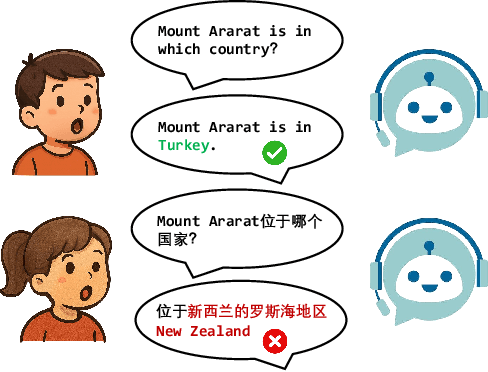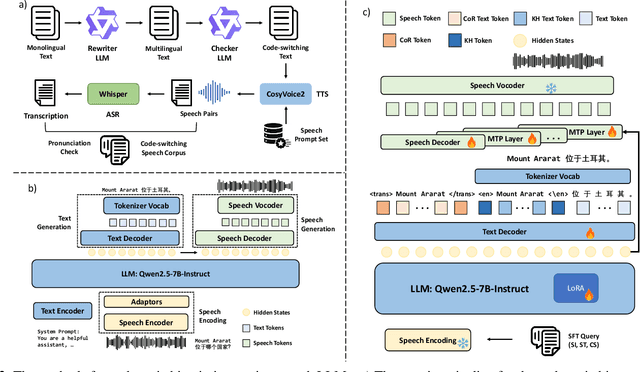Qunshan Gu
VocalNet-MDM: Accelerating Streaming Speech LLM via Self-Distilled Masked Diffusion Modeling
Feb 09, 2026Abstract:Recent Speech Large Language Models~(LLMs) have achieved impressive capabilities in end-to-end speech interaction. However, the prevailing autoregressive paradigm imposes strict serial constraints, limiting generation efficiency and introducing exposure bias. In this paper, we investigate Masked Diffusion Modeling~(MDM) as a non-autoregressive paradigm for speech LLMs and introduce VocalNet-MDM. To adapt MDM for streaming speech interaction, we address two critical challenges: training-inference mismatch and iterative overhead. We propose Hierarchical Block-wise Masking to align training objectives with the progressive masked states encountered during block diffusion decoding, and Iterative Self-Distillation to compress multi-step refinement into fewer steps for low-latency inference. Trained on a limited scale of only 6K hours of speech data, VocalNet-MDM achieves a 3.7$\times$--10$\times$ decoding speedup and reduces first-chunk latency by 34\% compared to AR baselines. It maintains competitive recognition accuracy while achieving state-of-the-art text quality and speech naturalness, demonstrating that MDM is a promising and scalable alternative for low-latency, efficient speech LLMs.
VocalBench-zh: Decomposing and Benchmarking the Speech Conversational Abilities in Mandarin Context
Nov 17, 2025



Abstract:The development of multi-modal large language models (LLMs) leads to intelligent approaches capable of speech interactions. As one of the most widely spoken languages globally, Mandarin is supported by most models to enhance their applicability and reach. However, the scarcity of comprehensive speech-to-speech (S2S) benchmarks in Mandarin contexts impedes systematic evaluation for developers and hinders fair model comparison for users. In this work, we propose VocalBench-zh, an ability-level divided evaluation suite adapted to Mandarin context consisting of 10 well-crafted subsets and over 10K high-quality instances, covering 12 user-oriented characters. The evaluation experiment on 14 mainstream models reveals the common challenges for current routes, and highlights the need for new insights into next-generation speech interactive systems. The evaluation codes and datasets will be available at https://github.com/SJTU-OmniAgent/VocalBench-zh.
VocalNet-M2: Advancing Low-Latency Spoken Language Modeling via Integrated Multi-Codebook Tokenization and Multi-Token Prediction
Nov 13, 2025Abstract:Current end-to-end spoken language models (SLMs) have made notable progress, yet they still encounter considerable response latency. This delay primarily arises from the autoregressive generation of speech tokens and the reliance on complex flow-matching models for speech synthesis. To overcome this, we introduce VocalNet-M2, a novel low-latency SLM that integrates a multi-codebook tokenizer and a multi-token prediction (MTP) strategy. Our model directly generates multi-codebook speech tokens, thus eliminating the need for a latency-inducing flow-matching model. Furthermore, our MTP strategy enhances generation efficiency and improves overall performance. Extensive experiments demonstrate that VocalNet-M2 achieves a substantial reduction in first chunk latency (from approximately 725ms to 350ms) while maintaining competitive performance across mainstream SLMs. This work also provides a comprehensive comparison of single-codebook and multi-codebook strategies, offering valuable insights for developing efficient and high-performance SLMs for real-time interactive applications.
CS3-Bench: Evaluating and Enhancing Speech-to-Speech LLMs for Mandarin-English Code-Switching
Oct 09, 2025



Abstract:The advancement of multimodal large language models has accelerated the development of speech-to-speech interaction systems. While natural monolingual interaction has been achieved, we find existing models exhibit deficiencies in language alignment. In our proposed Code-Switching Speech-to-Speech Benchmark (CS3-Bench), experiments on 7 mainstream models demonstrate a relative performance drop of up to 66% in knowledge-intensive question answering and varying degrees of misunderstanding in open-ended conversations. Starting from a model with severe performance deterioration, we propose both data constructions and training approaches to improve the language alignment capabilities, specifically employing Chain of Recognition (CoR) to enhance understanding and Keyword Highlighting (KH) to guide generation. Our approach improves the knowledge accuracy from 25.14% to 46.13%, with open-ended understanding rate from 64.5% to 86.5%, and significantly reduces pronunciation errors in the secondary language. CS3-Bench is available at https://huggingface.co/datasets/VocalNet/CS3-Bench.
DualComp: End-to-End Learning of a Unified Dual-Modality Lossless Compressor
May 22, 2025Abstract:Most learning-based lossless compressors are designed for a single modality, requiring separate models for multi-modal data and lacking flexibility. However, different modalities vary significantly in format and statistical properties, making it ineffective to use compressors that lack modality-specific adaptations. While multi-modal large language models (MLLMs) offer a potential solution for modality-unified compression, their excessive complexity hinders practical deployment. To address these challenges, we focus on the two most common modalities, image and text, and propose DualComp, the first unified and lightweight learning-based dual-modality lossless compressor. Built on a lightweight backbone, DualComp incorporates three key structural enhancements to handle modality heterogeneity: modality-unified tokenization, modality-switching contextual learning, and modality-routing mixture-of-experts. A reparameterization training strategy is also used to boost compression performance. DualComp integrates both modality-specific and shared parameters for efficient parameter utilization, enabling near real-time inference (200KB/s) on desktop CPUs. With much fewer parameters, DualComp achieves compression performance on par with the SOTA LLM-based methods for both text and image datasets. Its simplified single-modality variant surpasses the previous best image compressor on the Kodak dataset by about 9% using just 1.2% of the model size.
VocalBench: Benchmarking the Vocal Conversational Abilities for Speech Interaction Models
May 21, 2025Abstract:The rapid advancement of large language models (LLMs) has accelerated the development of multi-modal models capable of vocal communication. Unlike text-based interactions, speech conveys rich and diverse information, including semantic content, acoustic variations, paralanguage cues, and environmental context. However, existing evaluations of speech interaction models predominantly focus on the quality of their textual responses, often overlooking critical aspects of vocal performance and lacking benchmarks with vocal-specific test instances. To address this gap, we propose VocalBench, a comprehensive benchmark designed to evaluate speech interaction models' capabilities in vocal communication. VocalBench comprises 9,400 carefully curated instances across four key dimensions: semantic quality, acoustic performance, conversational abilities, and robustness. It covers 16 fundamental skills essential for effective vocal interaction. Experimental results reveal significant variability in current model capabilities, each exhibiting distinct strengths and weaknesses, and provide valuable insights to guide future research in speech-based interaction systems. Code and evaluation instances are available at https://github.com/SJTU-OmniAgent/VocalBench.
VocalNet: Speech LLM with Multi-Token Prediction for Faster and High-Quality Generation
Apr 05, 2025Abstract:Speech large language models (LLMs) have emerged as a prominent research focus in speech processing. We propose VocalNet-1B and VocalNet-8B, a series of high-performance, low-latency speech LLMs enabled by a scalable and model-agnostic training framework for real-time voice interaction. Departing from the conventional next-token prediction (NTP), we introduce multi-token prediction (MTP), a novel approach optimized for speech LLMs that simultaneously improves generation speed and quality. Experiments show that VocalNet outperforms mainstream Omni LLMs despite using significantly less training data, while also surpassing existing open-source speech LLMs by a substantial margin. To support reproducibility and community advancement, we will open-source all model weights, inference code, training data, and framework implementations upon publication.
 Add to Chrome
Add to Chrome Add to Firefox
Add to Firefox Add to Edge
Add to Edge